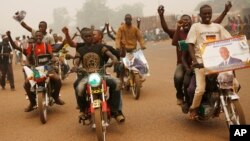With two days left until the final round of the presidential election in the Central African Republic, a VOA sampling of opinions in the northern prefecture of Nana Gribizi found that the campaign message of former Prime Minister Faustin Archange Touadera was resonating with many voters.
Touadera’s campaign makes much of his record as prime minister between 2008 and 2013, when he is said to have fought corruption and paid salaries regularly. That's significant to voters like Antoinette Bolobo, a petty trader living in a displaced persons camp in Bangui.
Bolobo said she and her neighbors would vote for Touadera. He always paid government workers’ salaries, she said, and that was good for her business.
Villagers in Nana Gribizi, a district still plagued by sectarian violence, applauded a speech from a Touadera campaign worker who said Touadera wasn't wealthy and couldn't buy votes but knew how they lived and knew what do do if elected.
Enthusiastic supporters of the other former prime minister in the runoff, Anicet Georges Dologuele, have not been so easy to find this past week, although VOA ran into a few in Bangui.
“Children, do you want to see the candidate?” asked one electioneer. “Vote for our candidate, vote Dologuele!”
The children cannot vote, but one adult pledged to vote for Dologuele because he paid back the country’s debt to the International Monetary Fund and therefore deserved to win.
Unlike Touadera, Dologuele says nothing in his action plan about his record on corruption while in office.
First-round winner
He agreed to a political pact last year with former President Francois Bozize, which helped him win the first round of the election in December with 23 percent of the vote. But only three of the 29 other candidates in that round have said they would back Dologuele in round two, while 20 have said they would back Touadera, who finished second in the first round with 19 percent support.
Sunday also will bring a rerun of elections for the national assembly. They were held in late December, but the results were nullified owing to numerous irregularities, including failure to hold the vote in many constituencies because of a lack of ballots.
Distributing those ballots is a major challenge in a country larger than France that has few roads. The U.N. mission, MINUSCA, has been flying election materials around the country, and with the French military will be helping to provide security.




